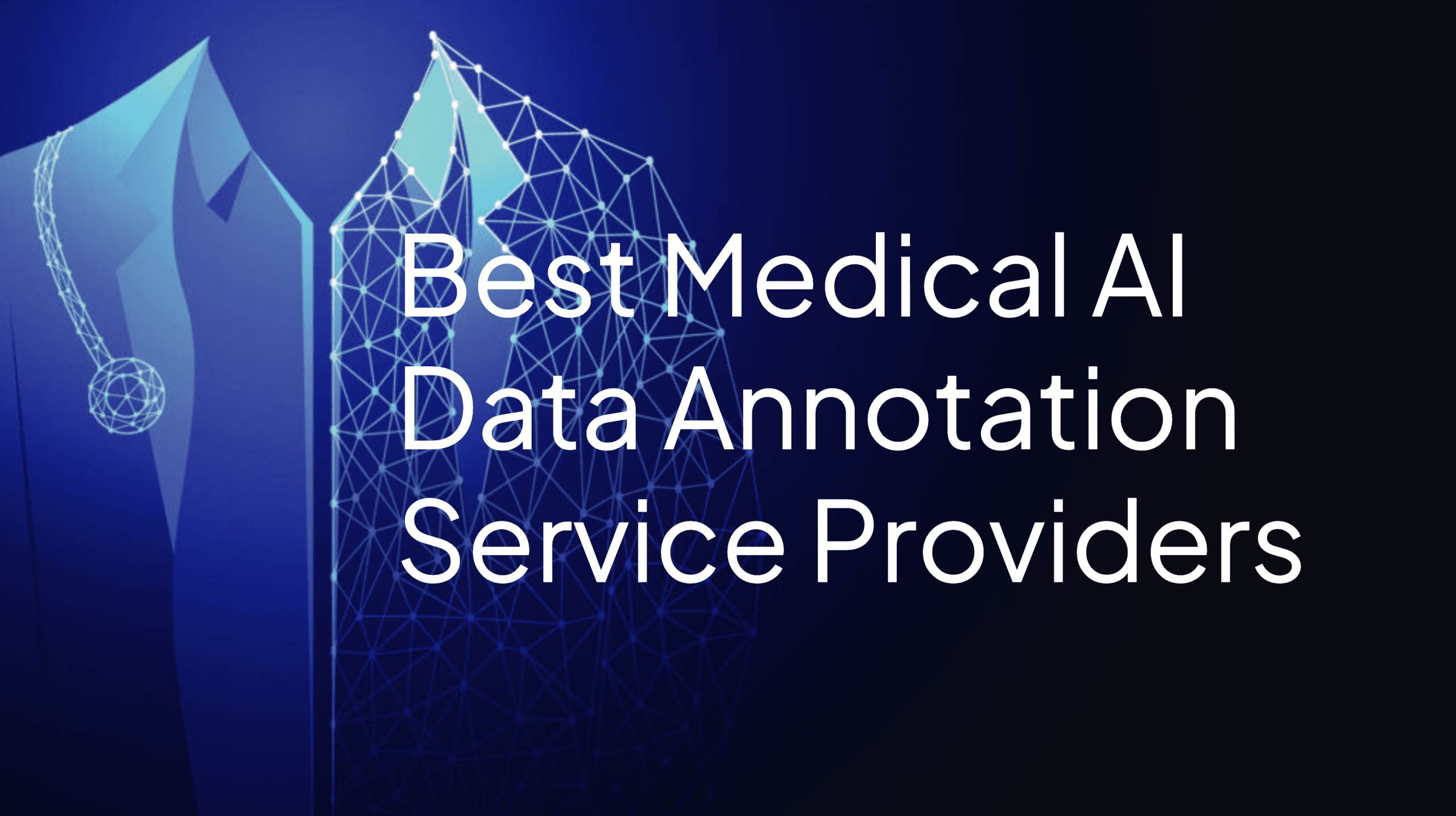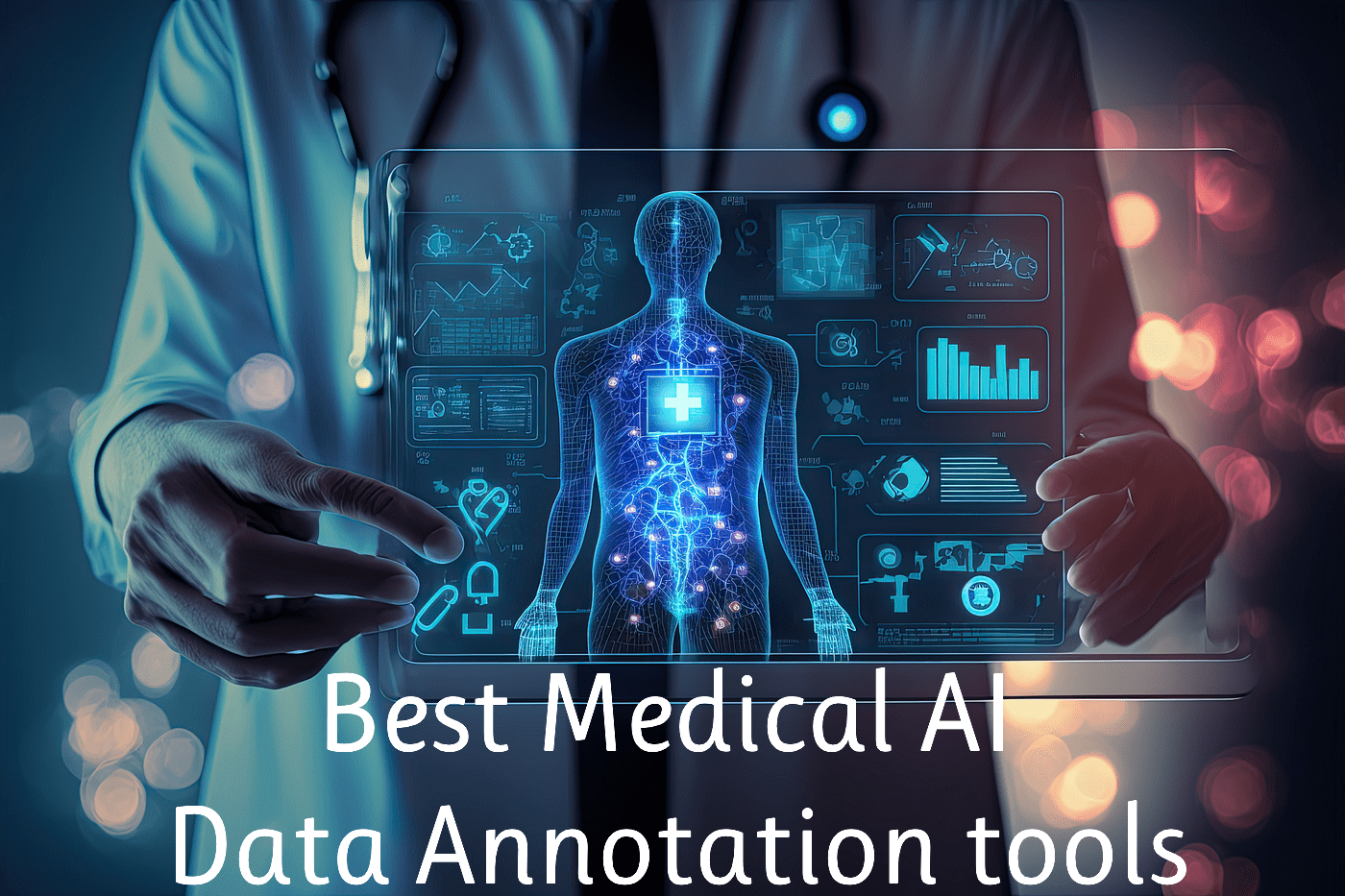Introduction The realm of medical artificial intelligence (AI) is revolutionizing healthcare. From automating disease detection in medical images to streamlining clinical workflows, AI holds immense potential to improve patient outcomes and healthcare delivery. However, the success of these AI models hinges on one crucial element: high-quality labeled medical data. This is where medical AI data annotation service providers come into play. Understanding Medical Data Annotation Medical data annotation involves meticulously labeling medical data, such as images, text (electronic health records, clinical notes), and waveforms, with relevant information. This information could be bounding boxes around tumors in X-rays, classifying abnormal tissue types, or identifying specific medical terms within clinical notes. Accurate and consistent annotations are essential for training AI models to accurately interpret medical data and make reliable predictions. Challenges in Medical Data Annotation Medical data annotation presents unique challenges: Complexity: Medical data can be highly intricate, requiring specialized knowledge of anatomy, pathology, and medical terminology. Privacy: Medical data is subject to strict privacy regulations, necessitating secure data handling practices by annotation providers. Scalability: Training robust AI models demands vast amounts of labeled data, making scalability a critical concern. The Role of Medical AI Data Annotation Service Providers Medical AI data annotation service providers bridge the gap between raw medical data and high-quality labeled datasets. These companies offer a range of services, including: Data Sourcing: Some providers can source medical data from diverse sources, adhering to data privacy regulations. Project Management: Experienced teams manage annotation projects, ensuring efficient workflows and timely delivery. Annotation Tools: Providers offer specialized annotation platforms designed for medical data, streamlining the labeling process. Expert Annotators: A critical aspect is the workforce. These companies recruit and train medical professionals with relevant expertise to ensure accurate annotations. Quality Control: Rigorous quality control measures are implemented to verify the accuracy and consistency of annotations. Choosing the Right Medical AI Data Annotation Service Provider Selecting the most suitable service provider for your medical AI project requires careful consideration of several factors: Expertise: Does the provider have experience in your specific medical domain (e.g., radiology, oncology)? Scalability: Can they handle the volume and complexity of your data needs? Data Security: Do they have robust data security protocols to comply with HIPAA and other regulations? Cost: Compare pricing models and ensure transparency in costs. Communication: Effective communication and collaboration are crucial for successful project execution. Top Medical AI Data Annotation Service Providers The landscape of medical AI data annotation services is evolving rapidly. Here’s a glimpse into some leading providers: SO Development SO Development recognizes that every medical AI project is unique and requires a tailored solution. Their team of medical professionals and experienced annotators work collaboratively to ensure accurate and efficient data labeling that aligns with your specific project goals. Ango Hub (by iMerit) This platform leverages a global workforce with expertise in medical data. They offer annotation solutions for tasks like image classification, bounding boxes, and semantic segmentation. Alegion A leading provider with a global workforce, including medical professionals for medical data annotation projects. They offer a secure annotation platform and focus on scalability for large datasets. Cogito Tech This company provides data annotation services across various industries and offers expertise in medical data annotation. They can handle tasks like image classification, segmentation, and bounding box creation. Anolytics This provider specializes in medical image annotation services, offering a comprehensive suite tailored for the healthcare sector. Their team of skilled annotators with expertise in radiology and pathology ensures a deep understanding of medical nuances. Labelbox A well-established platform catering to various industries, including healthcare. Labelbox offers solutions for medical image annotation tasks like object detection, segmentation, and classification. Beyond the Top 3: Additional Considerations Several other providers cater to medical AI data annotation needs. Here are some additional factors to consider when making your choice: Focus on specific medical domains: Some providers might specialize in particular medical areas like ophthalmology or dermatology. Advanced Annotation Techniques: Look for providers offering techniques like active learning or computer-assisted annotation for improved efficiency. In-house expertise: Certain providers might have their own team of medical professionals for annotation tasks. The Future of Medical AI Data Annotation As the field of medical AI continues to advance, so too will the landscape of data annotation services. We can expect to see: Automation and AI-assisted annotation: Automation tools and AI-assisted workflows will streamline the annotation process. Focus on explainability and bias detection: Emphasis will be placed on ensuring AI models trained on annotated data are unbiased and interpretable. Standardization and best practices: Industry-wide best practices and potentially standardized annotation processes will emerge. Conclusion Medical AI holds immense potential to transform healthcare delivery. By investing in high-quality data annotation, fostering collaboration between researchers, developers, and medical professionals, and prioritizing ethical considerations, we can pave the way for a future where AI empowers improved patient care, earlier disease detection, and more effective treatments. Visit Our Medical Data Annotation Service Visit Now
Introduction The field of medical artificial intelligence (AI) is revolutionizing healthcare. From automating disease detection in medical images to personalizing treatment plans, AI holds immense potential to improve patient outcomes and healthcare efficiency. However, the cornerstone of successful medical AI lies in the quality of the data used to train these intelligent systems. This is where medical AI data annotation tools come into play. What is Medical AI Data Annotation? Medical AI data annotation involves meticulously labeling and structuring medical data to train AI algorithms. This data can encompass various formats: Medical Images: X-rays, CT scans, MRIs, etc., requiring annotations for specific anatomical structures, lesions, or abnormalities. Electronic Health Records (EHRs): Clinical notes, lab reports, and other patient data needing annotations for relevant medical concepts, diagnoses, or procedures. Biomedical Signals: ECGs, EEGs, and other physiological signals requiring annotations for specific events or patterns. The annotation process essentially translates the expertise of medical professionals into a format that AI algorithms can understand. High-quality annotations are crucial for building accurate and reliable medical AI models. Challenges of Medical AI Data Annotation Medical data annotation presents unique challenges: Complexity: Medical data can be highly intricate, requiring deep domain knowledge for accurate labeling. Subtle variations in anatomical structures or ambiguous findings necessitate expert judgment. Privacy Concerns: Patient privacy is paramount. Medical data annotation tools must comply with strict regulations like HIPAA to ensure data security and anonymization. Scalability: Training robust AI models often demands vast amounts of annotated data. Tools need to streamline workflows and enable efficient annotation by large teams. Cost: Hiring medical professionals for annotation can be expensive. Tools should optimize annotation processes to reduce time and resource requirements. How Medical AI Data Annotation Tools Address These Challenges Modern medical AI data annotation tools offer a range of features to overcome these hurdles: Specialized Annotation Workflows: These tools provide user-friendly interfaces tailored to specific medical data types, like image segmentation tools for X-rays or text tagging tools for EHRs. Collaboration Features: Platforms facilitate communication and collaboration between annotators, allowing for real-time feedback and consistency checks. Active Learning: These tools employ active learning techniques to identify data points with the highest uncertainty and prioritize them for annotation, maximizing efficiency. Quality Control Measures: Tools incorporate built-in quality control mechanisms to ensure annotation accuracy, including double-annotation and inter-rater reliability checks. Data Security and Compliance: Secure cloud platforms with role-based access control and encryption safeguard patient privacy and adhere to regulatory requirements. Choosing the Right Medical AI Data Annotation Tool With a growing number of medical AI data annotation tools available, selecting the most suitable option requires careful consideration. Here are key factors to evaluate: Encord A sophisticated platform specifically designed for medical AI teams. It offers DICOM and NIfTI image support, active learning functionalities, and robust quality control measures. 3D Slicer A free, open-source platform popular for its versatility and advanced image segmentation capabilities. It requires some technical expertise but caters well to research projects. Labellerr A comprehensive platform offering annotation services for various medical data formats, including images and EHRs. It emphasizes data-driven healthcare insights and ensures high annotation precision. Supervisely A user-friendly platform with a web-based interface. It supports DICOM files and offers functionalities familiar to medical professionals, facilitating a smooth learning curve. Labelbox A widely used annotation platform that can be adapted for medical data annotation Visit Our Medical Data Annotation Service Visit Now
In today’s healthcare industry, medical data is a crucial element for both healthcare providers and patients. This data can provide valuable insights into the diagnosis and treatment of various health conditions, and can also help providers optimize their workflows and improve patient outcomes. However, with the amount of data that is generated on a daily basis, it can be overwhelming for providers to keep up with the task of manually annotating and analyzing this data. This is where outsourcing medical data annotation can be beneficial. In this article, we will explore why outsourcing your medical data to us with data annotation is a smart decision. What is Medical Data Annotation? Medical data annotation involves labeling and categorizing medical data for use in machine learning and other AI-driven applications. This process helps to make the data more understandable and accessible, and allows AI systems to identify patterns and relationships within the data. Medical data annotation can be applied to a wide range of medical data, including patient records, medical images, lab results, and more. Why Outsource Medical Data Annotation? Outsourcing medical data annotation has many benefits, including: Expertise: By outsourcing medical data annotation, you gain access to a team of experts who are trained in medical terminology and coding. These experts can quickly and accurately annotate your medical data, ensuring that it is correctly labeled and categorized for use in AI-driven applications. Cost Savings: Outsourcing medical data annotation can be more cost-effective than hiring and training an in-house team to do the work. This can be especially beneficial for smaller healthcare providers who may not have the resources to invest in a full-time data annotation team. Efficiency: Medical data annotation can be a time-consuming and tedious task. By outsourcing this work, healthcare providers can free up their staff’s time to focus on other important tasks, such as patient care. Scalability: Outsourcing medical data annotation allows healthcare providers to easily scale up or down their annotation needs as their data volume changes. This can help providers save money and avoid wasting resources on unnecessary overhead. Improved Accuracy: Medical data annotation requires a high level of accuracy to ensure that the data is correctly labeled and categorized. By outsourcing this work to a team of experts, healthcare providers can ensure that their data is annotated with the highest level of accuracy. Why Choose Us for Medical Data Annotation? If you are considering outsourcing your medical data annotation, there are many providers to choose from. Here are some reasons why you should choose us for your medical data annotation needs: Experience: Our team has years of experience in medical data annotation and has worked with a variety of healthcare providers, from small clinics to large hospitals. Quality: We pride ourselves on the quality of our work and ensure that all data annotation is done with a high level of accuracy and attention to detail. Scalability: Our team is able to scale up or down our annotation services to meet your needs, ensuring that you are only paying for the services you need. Security: We understand the importance of protecting sensitive medical data and take all necessary steps to ensure that your data is kept secure and confidential. Customer Service: We strive to provide excellent customer service and are always available to answer any questions or concerns you may have about our services. Examples of Medical Data Annotation Medical data annotation can be applied to a wide range of medical data. Here are some examples of the types of medical data that can be annotated: Electronic Health Records (EHRs): EHRs contain a wealth of medical data, including patient demographics, medical history, diagnoses, medications, and more. Annotating this data can help healthcare providers identify patterns and relationships within the data and make more informed treatment decisions. Medical Images: Medical images, such as X-rays, CT scans, and MRIs, can also benefit from annotation. Annotated medical images can be used to train AI systems to accurately identify and diagnose various conditions, improving the accuracy and efficiency of diagnosis and treatment. Lab Results: Lab results, such as blood tests and microbiology reports, can be annotated to help identify patterns and relationships within the data. This can help healthcare providers make more informed decisions about treatment and medication. Medical Billing Codes: Medical billing codes are used to identify and bill for specific medical services and procedures. Annotating these codes can help healthcare providers accurately track their billing and reimbursement processes. Clinical Trials: Clinical trial data can be annotated to help identify patterns and relationships within the data, improving the efficiency and accuracy of clinical research. Conclusion In conclusion, outsourcing medical data annotation can provide many benefits for healthcare providers, including expertise, cost savings, efficiency, scalability, and improved accuracy. By choosing us for your medical data annotation needs, you can benefit from our experience, quality, scalability, security, and customer service. Annotated medical data can be used to train AI systems to accurately diagnose and treat various conditions, improving patient outcomes and the overall quality of care. Visit Our Artificial intelligence Service Visit Now



